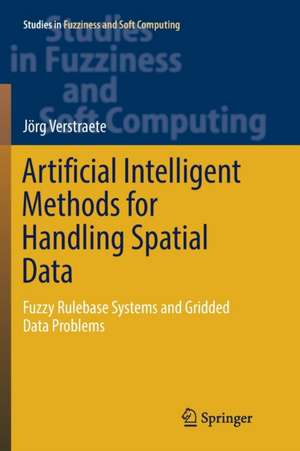Artificial Intelligent Methods for Handling Spatial Data: Fuzzy Rulebase Systems and Gridded Data Problems: Studies in Fuzziness and Soft Computing, cartea 370
Autor Jörg Verstraeteen Limba Engleză Paperback – 10 dec 2019
| Toate formatele și edițiile | Preț | Express |
|---|---|---|
| Paperback (1) | 638.37 lei 6-8 săpt. | |
| Springer International Publishing – 10 dec 2019 | 638.37 lei 6-8 săpt. | |
| Hardback (1) | 644.48 lei 6-8 săpt. | |
| Springer International Publishing – 11 sep 2018 | 644.48 lei 6-8 săpt. |
Din seria Studies in Fuzziness and Soft Computing
- 20%
 Preț: 999.85 lei
Preț: 999.85 lei - 20%
 Preț: 653.06 lei
Preț: 653.06 lei - 20%
 Preț: 872.98 lei
Preț: 872.98 lei - 20%
 Preț: 930.57 lei
Preț: 930.57 lei - 20%
 Preț: 1051.00 lei
Preț: 1051.00 lei - 20%
 Preț: 992.44 lei
Preț: 992.44 lei - 20%
 Preț: 655.85 lei
Preț: 655.85 lei - 20%
 Preț: 1001.86 lei
Preț: 1001.86 lei - 18%
 Preț: 954.14 lei
Preț: 954.14 lei - 20%
 Preț: 330.10 lei
Preț: 330.10 lei - 20%
 Preț: 333.04 lei
Preț: 333.04 lei - 20%
 Preț: 997.56 lei
Preț: 997.56 lei -
 Preț: 391.61 lei
Preț: 391.61 lei - 20%
 Preț: 647.79 lei
Preț: 647.79 lei - 20%
 Preț: 986.01 lei
Preț: 986.01 lei - 18%
 Preț: 958.56 lei
Preț: 958.56 lei - 20%
 Preț: 996.40 lei
Preț: 996.40 lei - 20%
 Preț: 999.35 lei
Preț: 999.35 lei - 15%
 Preț: 646.43 lei
Preț: 646.43 lei - 20%
 Preț: 651.57 lei
Preț: 651.57 lei - 20%
 Preț: 997.89 lei
Preț: 997.89 lei - 15%
 Preț: 641.03 lei
Preț: 641.03 lei - 20%
 Preț: 1009.74 lei
Preț: 1009.74 lei - 20%
 Preț: 992.62 lei
Preț: 992.62 lei -
 Preț: 388.72 lei
Preț: 388.72 lei - 18%
 Preț: 1223.43 lei
Preț: 1223.43 lei - 20%
 Preț: 651.42 lei
Preț: 651.42 lei - 18%
 Preț: 951.59 lei
Preț: 951.59 lei - 18%
 Preț: 948.61 lei
Preț: 948.61 lei
Preț: 638.37 lei
Preț vechi: 797.96 lei
-20% Nou
Puncte Express: 958
Preț estimativ în valută:
122.16€ • 130.62$ • 101.85£
122.16€ • 130.62$ • 101.85£
Carte tipărită la comandă
Livrare economică 18 aprilie-02 mai
Preluare comenzi: 021 569.72.76
Specificații
ISBN-13: 9783030130954
ISBN-10: 3030130959
Pagini: 135
Ilustrații: XVI, 135 p. 53 illus., 46 illus. in color.
Dimensiuni: 155 x 235 mm
Greutate: 0.22 kg
Ediția:Softcover reprint of the original 1st ed. 2019
Editura: Springer International Publishing
Colecția Springer
Seria Studies in Fuzziness and Soft Computing
Locul publicării:Cham, Switzerland
ISBN-10: 3030130959
Pagini: 135
Ilustrații: XVI, 135 p. 53 illus., 46 illus. in color.
Dimensiuni: 155 x 235 mm
Greutate: 0.22 kg
Ediția:Softcover reprint of the original 1st ed. 2019
Editura: Springer International Publishing
Colecția Springer
Seria Studies in Fuzziness and Soft Computing
Locul publicării:Cham, Switzerland
Cuprins
Introduction.- Problem Description and Related Work.- Concept.- Fuzzy Rulebase Systems.- Parameters and most Possible Ranges.- Rulebase Construction.- Constrained Defuzzification.- Data Comparison.- Experiments.- Conclusion.
Textul de pe ultima copertă
This book provides readers with an insight into the development of a novel method for regridding gridded spatial data, an operation required to perform the map overlay operation and apply map algebra when processing spatial data. It introduces the necessary concepts from spatial data processing and fuzzy rulebase systems and describes the issues experienced when using current regridding algorithms. The main focus of the book is on describing the different modifications needed to make the problem compatible with fuzzy rulebases. It offers a number of examples of out-of-the box thinking to handle aspects such as rulebase construction, defuzzification, spatial data comparison, etc. At first, the emphasis is put on the newly developed method, and additional datasets containing information on the underlying spatial distribution of the data are identified. After this, an artificial intelligent system (in the form of a fuzzy inference system) is constructed using this knowledge and then applied on the input data to perform the regridding. The book offers an example of how an apparently simple problem can pose many different challenges, even when trying to solve it with existing soft computing technologies. The workflow and solutions to solve these challenges are universal and may therefore be broadly applied into other contexts.
Caracteristici
Reports on a novel method combining fuzzy inference systems with spatial data to solve the map overlay problem Describes modification of existing inference systems and their applications to new problems Demonstrates the efficacy of the method with several experiments on disambiguation and regridding Offers a detailed description of the algorithm implementation process
